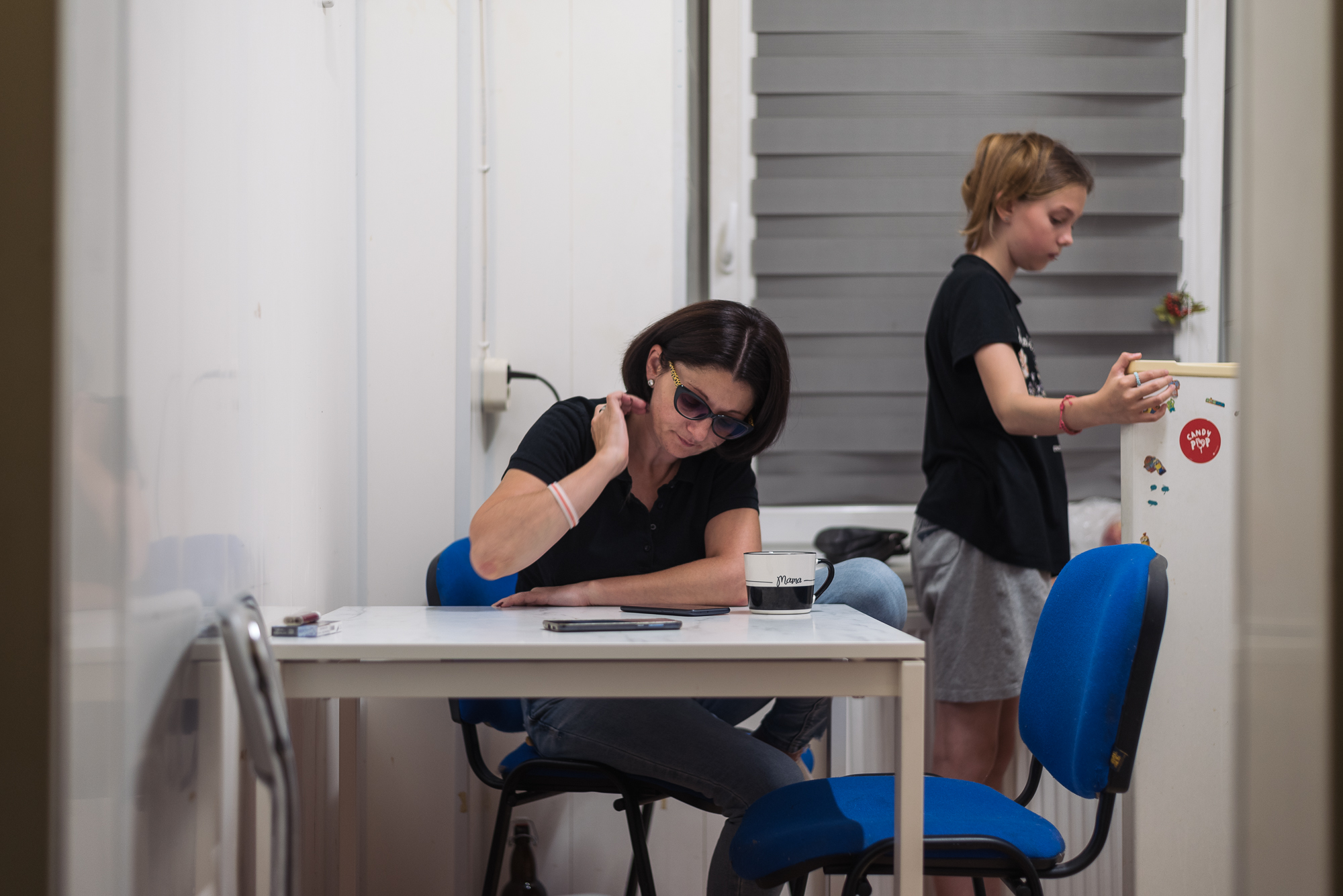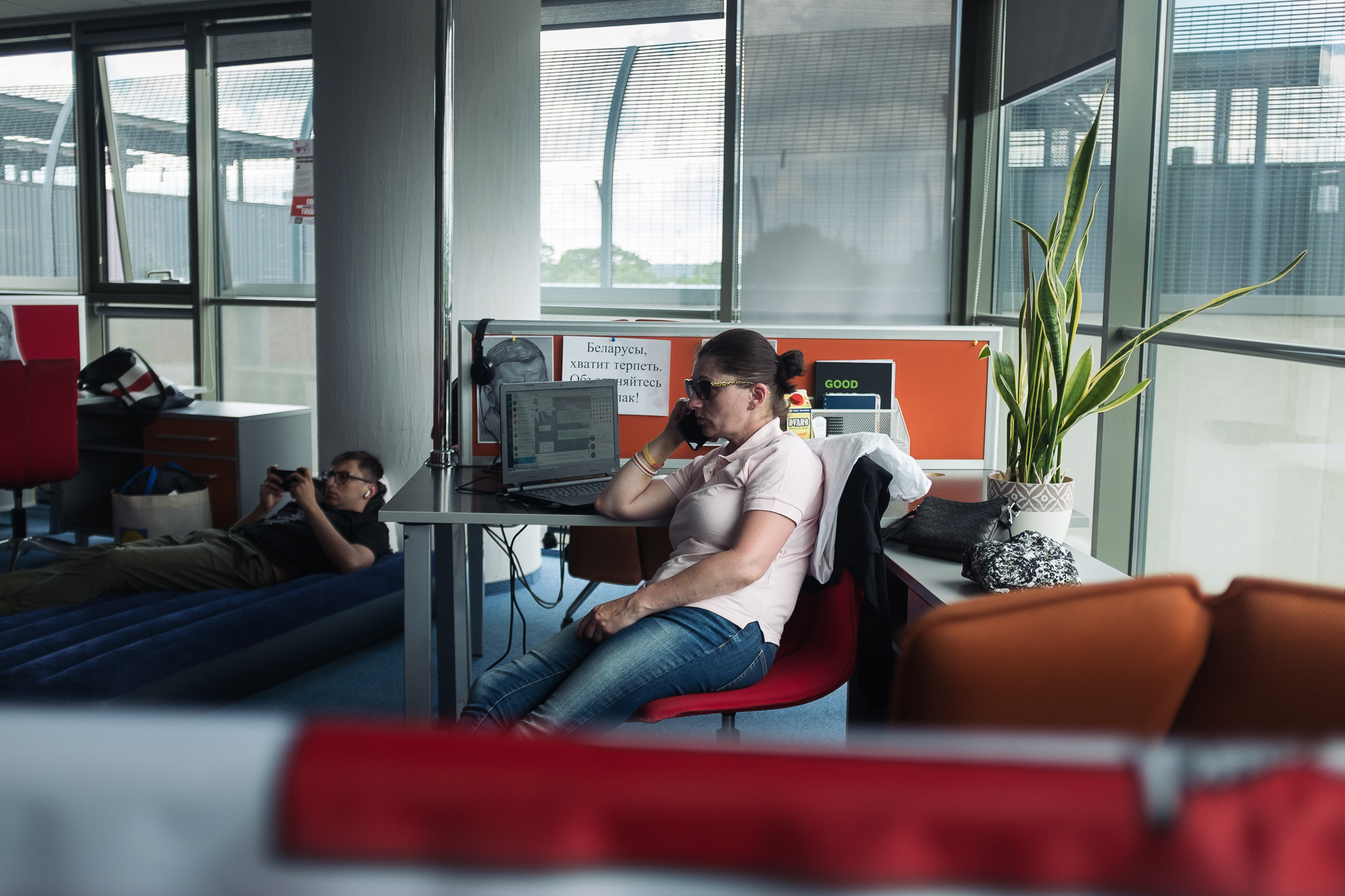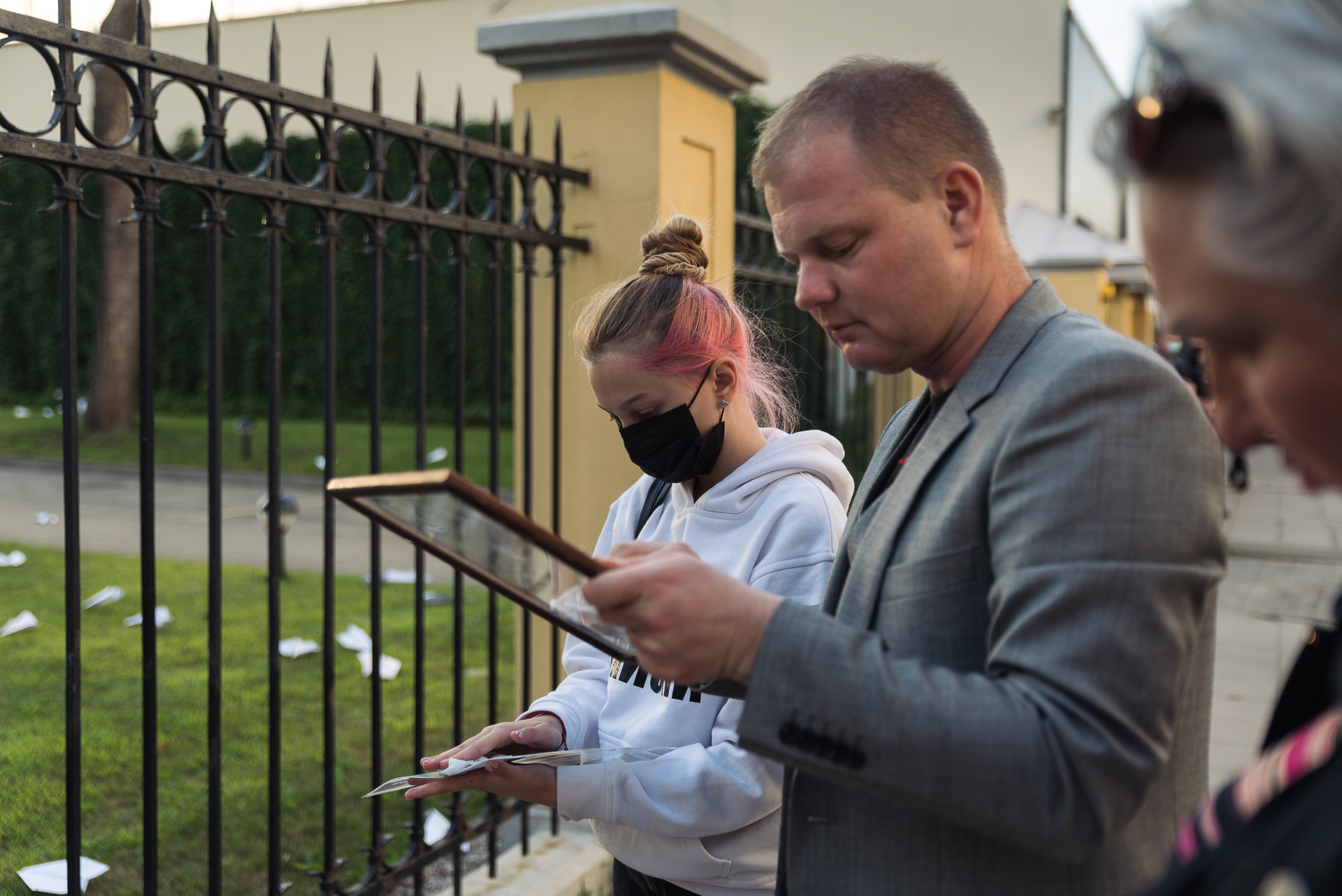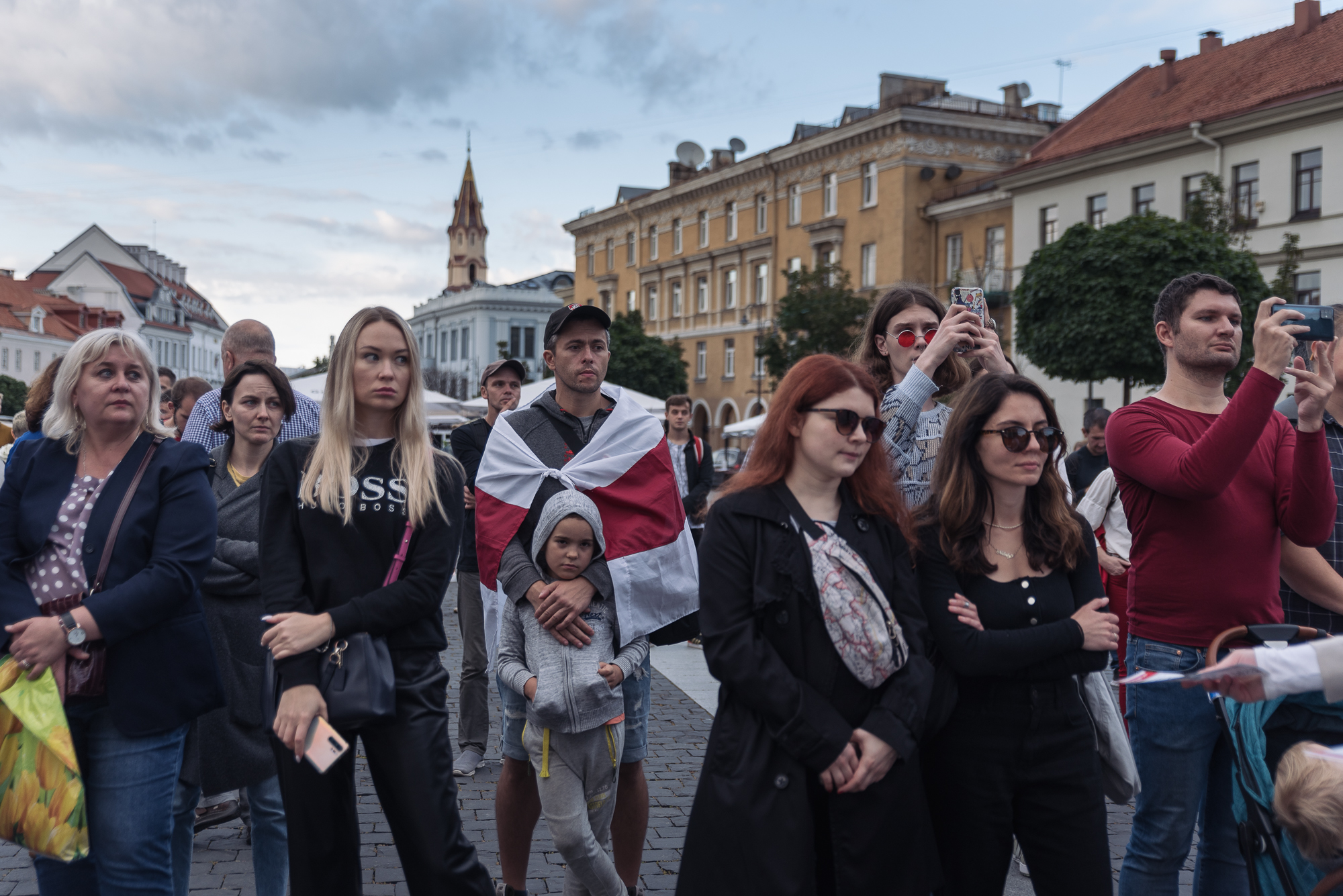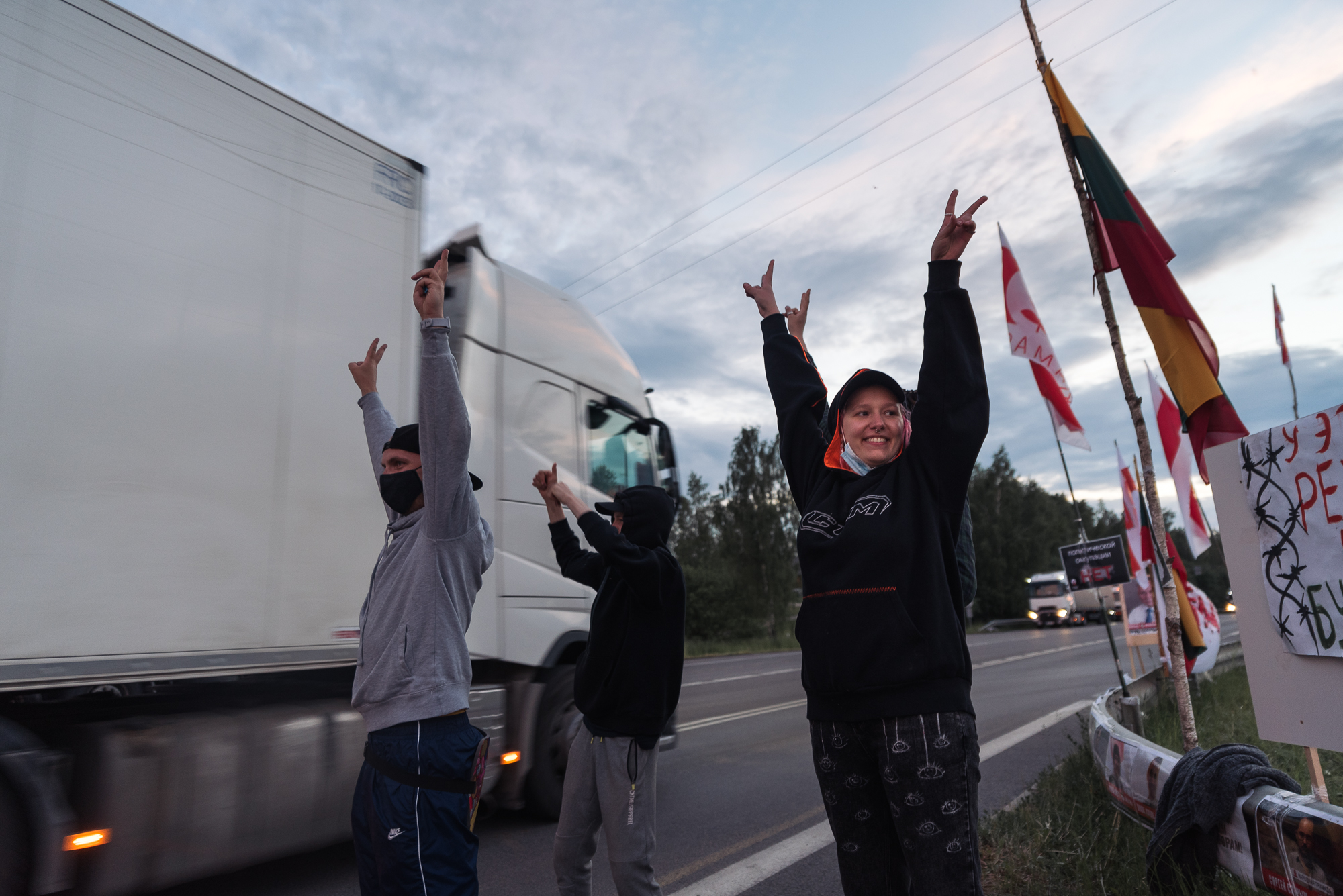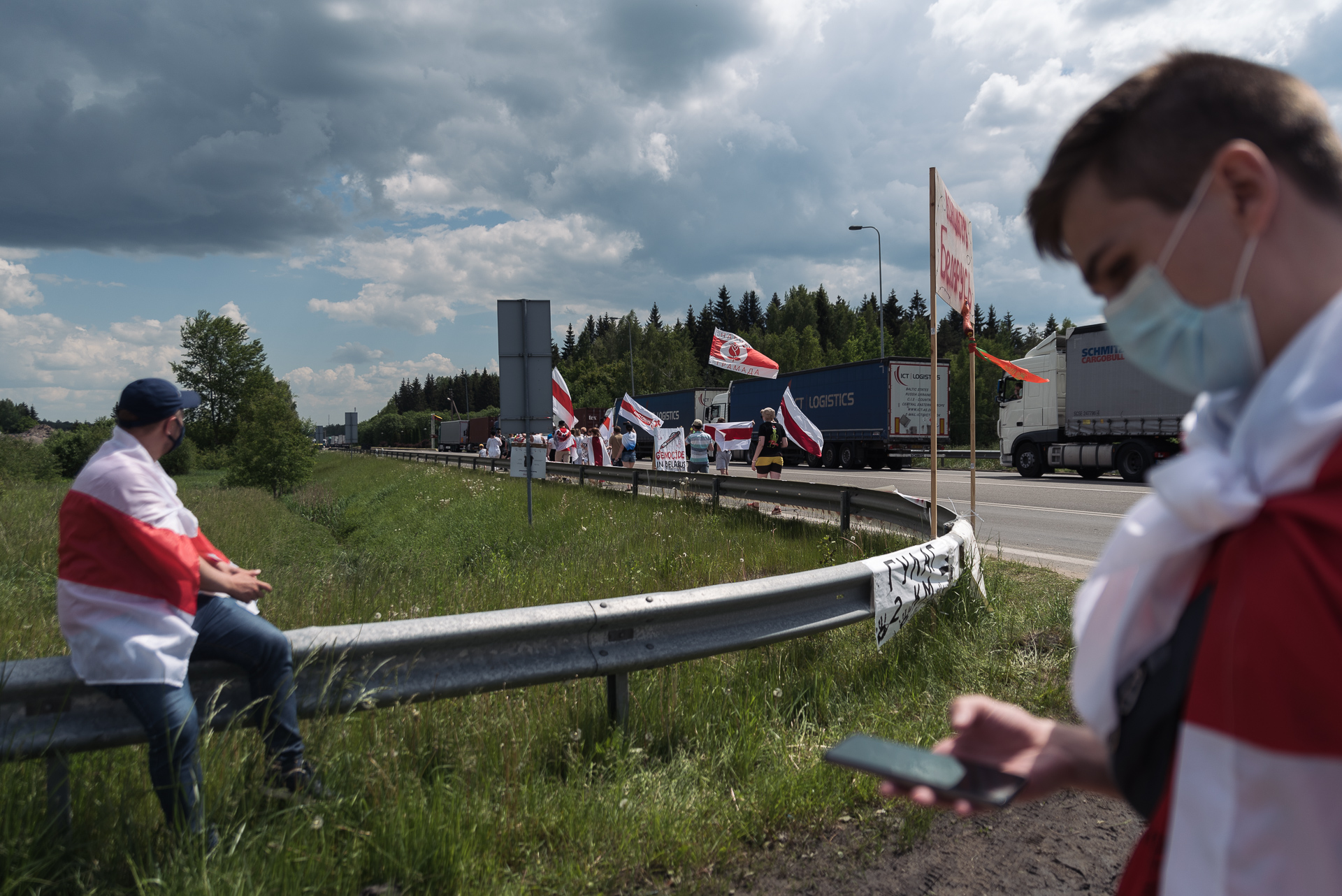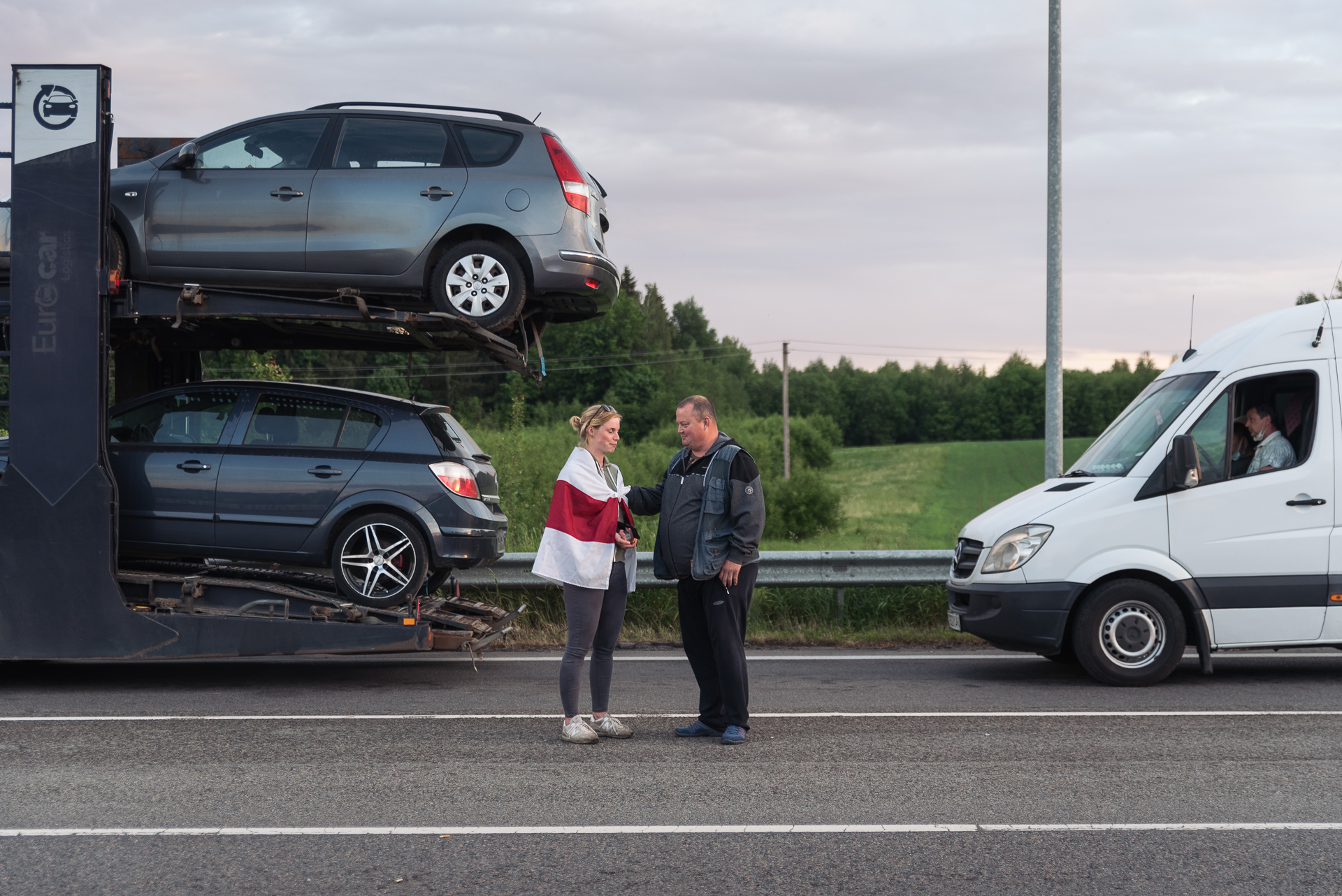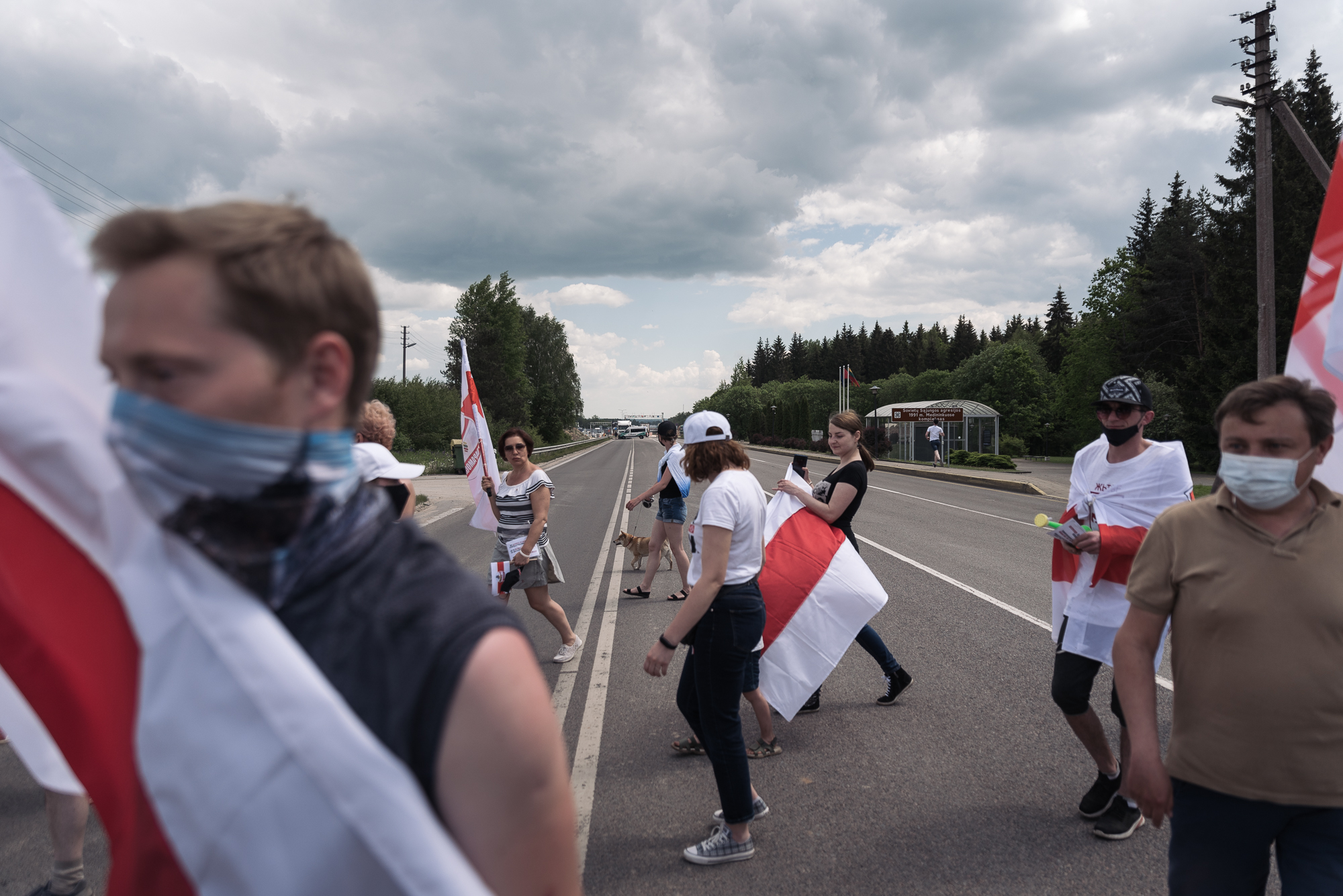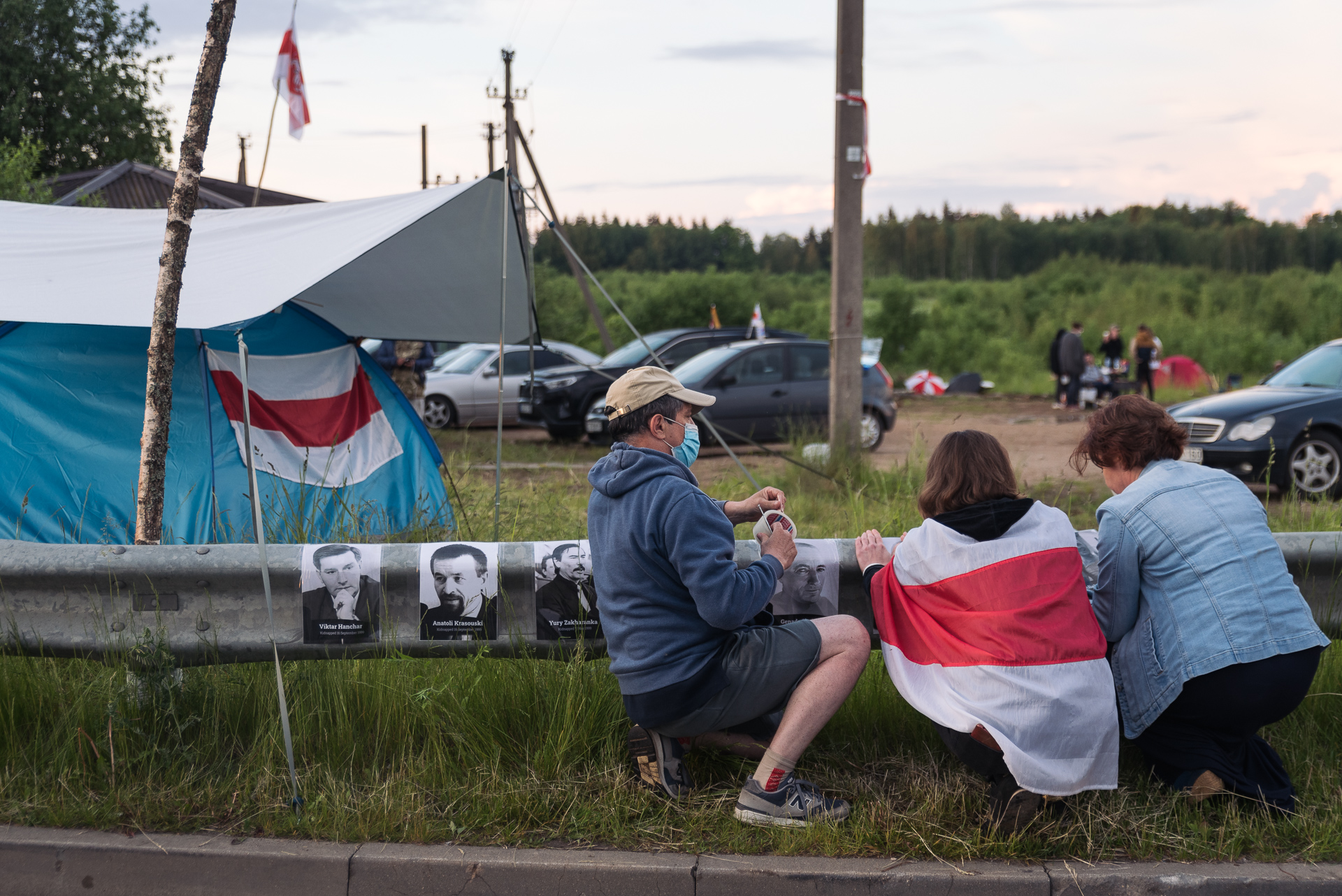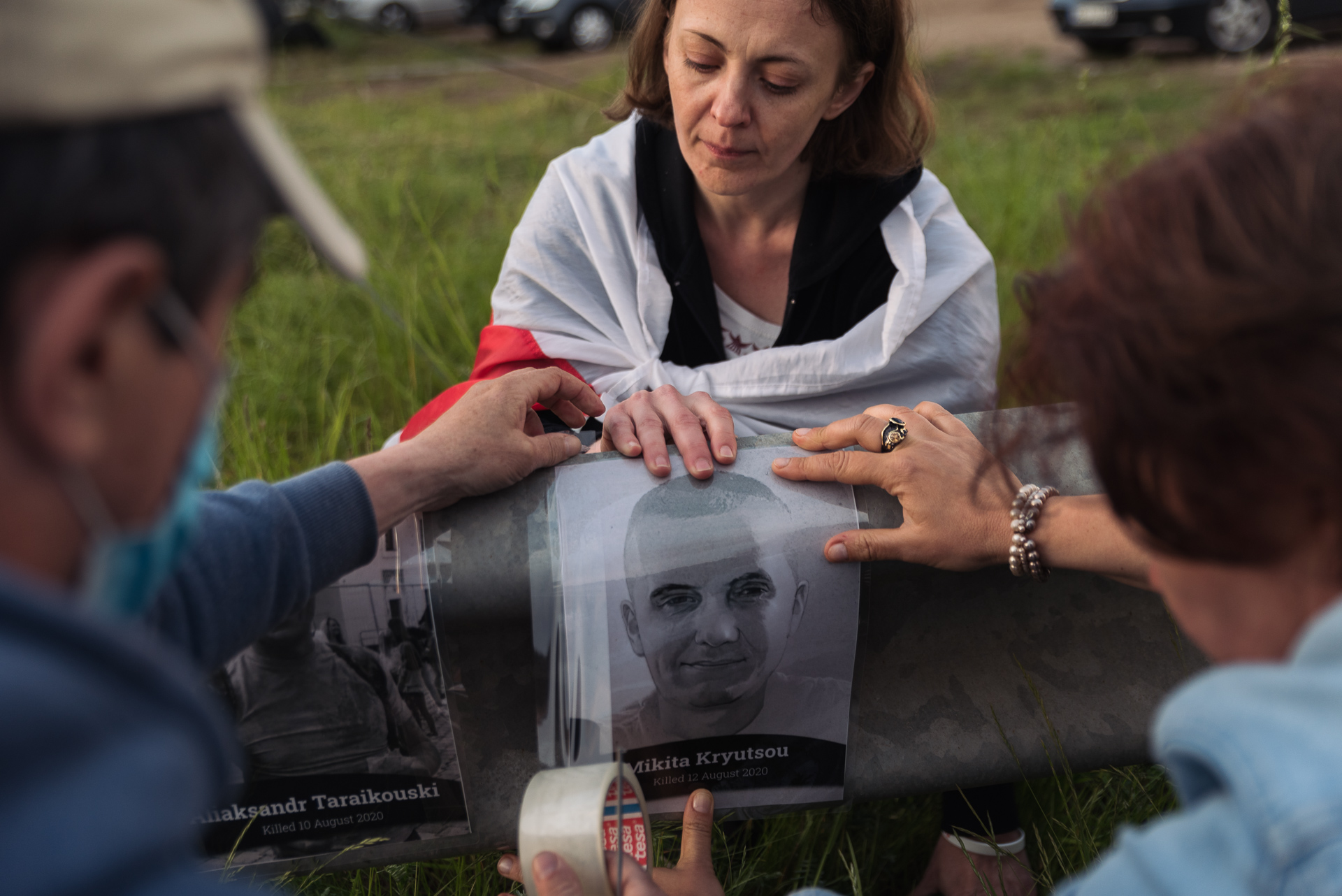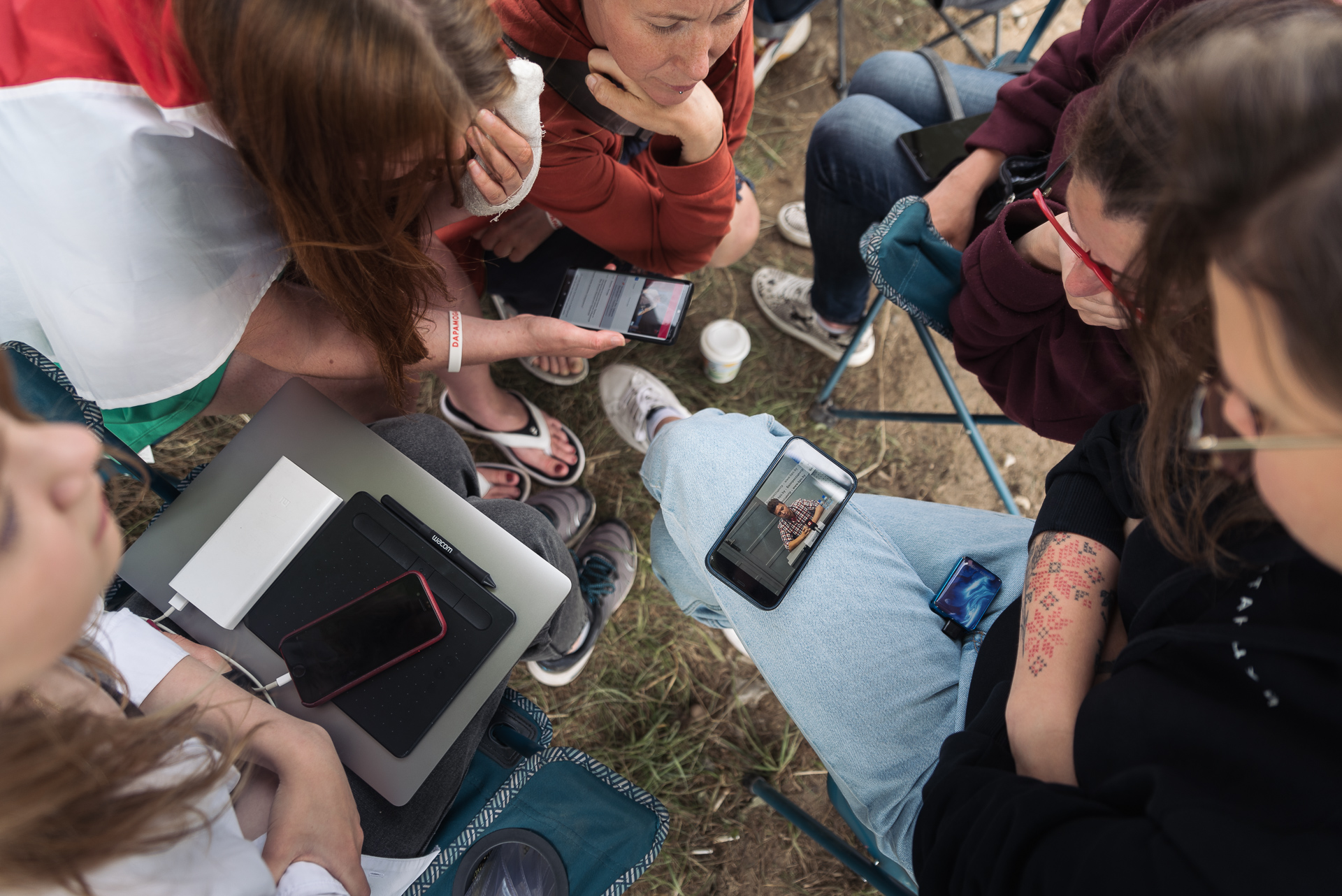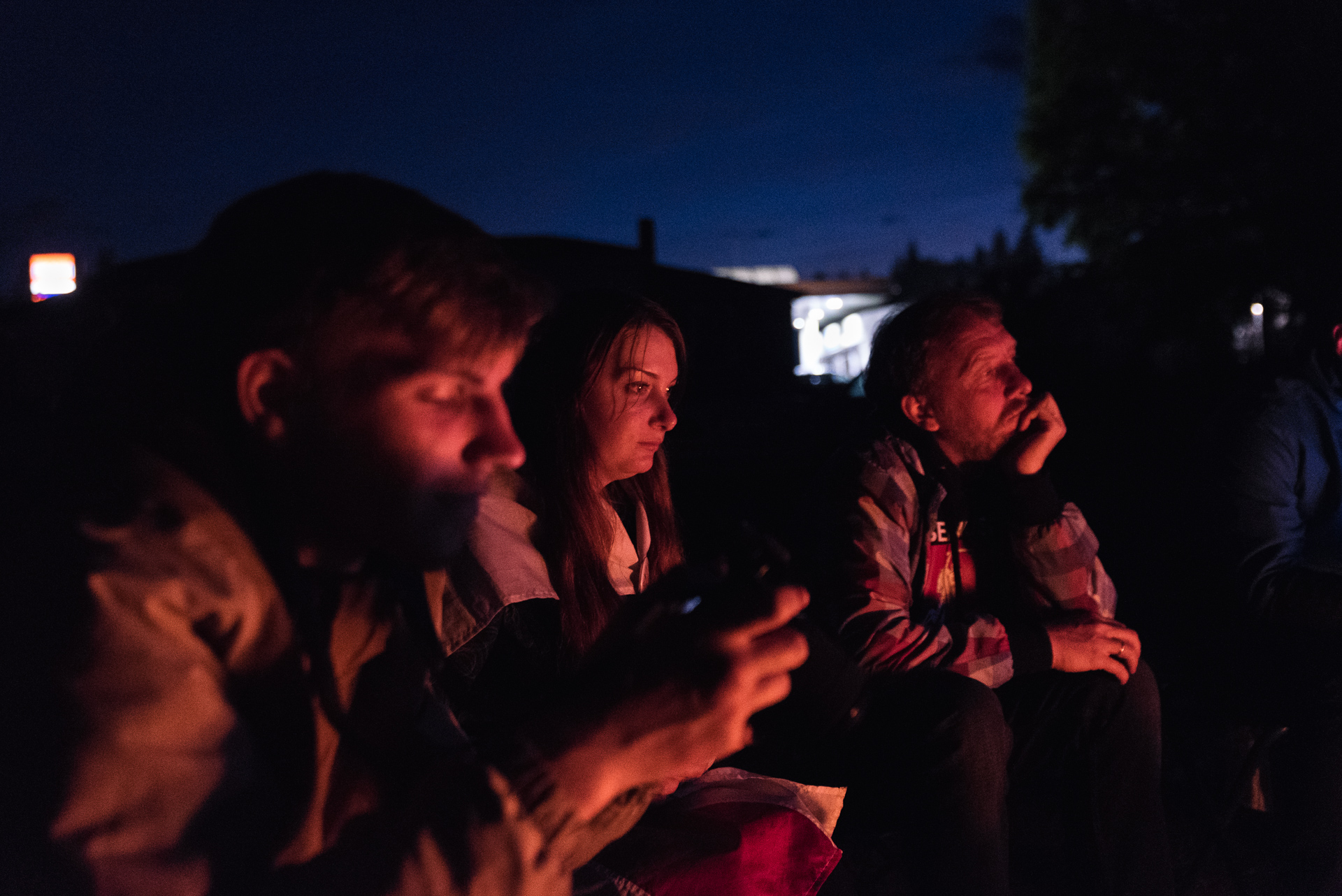Olga Zazulinskaya is one of the many activists in Vilnius helping families of political prisoners in Belarus.
She is also one of the many activists helping those who end up in Lithuania – including the ones who cross secretly through the dense forests separating the country from Belarus.
“My work does not bring victory closer, but my work helps people – for the families to survive, for the political prisoners not to feel alone, for those who have arrived to feel like they have a strong shoulder next to them.”
“I measure my life before and after the elections.”
Olga’s Telegram account is the lifeline for many on the other side of the border in Belarus.
“I get a call and they say: ‘Olga, they [the KGB] are knocking on our doors. What should we do?’”
The Belarusian secret service that kept the Soviet-era acronym, the KGB, also made Olga flee to Lithuania.
Everything began when she was an independent election monitor in August 2020.
“We sat like dogs by the fence [at a polling site], and were registering voters. This is how the voting took place.”
As the election results were announced – which saw Lukashenko claim a landslide victory despite the brazen and widespread falsifications – thousands of Belarusians flooded the streets in Minsk. The violent crackdown followed.
“I saw all of this with my own eyes – grenades thrown, a person killed, an ambulance filled with OMON [riot police] driving into the crowd. Probably since that day normal life has disappeared.”
In October 2020 in Minsk, Olga joined a support helpline run by Viasna, a leading Belarusian human rights group which also helped families locate missing people. Soon enough, volunteers working there were being detained one by one.
The week-long volunteering brought her into the hands of the KGB – she was detained on her way to work.
“I was tapped on the shoulder, I turned around, and immediately understood, that’s it – they have come for me.”
With a black mask pulled over her head, she was dragged into an unmarked van. She only understood where she was being taken by feeling the old railing along the walls – it was the dreaded KGB building in the centre of Minsk.
During her 15-hour detention, three officers took turns interrogating her.
“Three hours later there was such smog [from cigarettes] inside the room. You are thirsty, the windows are closed. They leave the room, breathe a bit and return, but I remain sitting on the chair.”
“They told me, ‘you probably don’t understand what prison is, and you will end up there, you will see. And then we will meet again.’”
But they didn’t see each other again.
Afraid that the regime will use her 13-year-old daughter to blackmail her, she had to make a tough call.
They decided, almost overnight, that Olga would leave together with her 21-year-old son Gleb, a young civil servant at the Interior Ministry, and her 13-year-old daughter Nastya.
Like many others, they found themselves on the border with hastily assembled backpacks.
It was Olga’s daughter Nastya, a promising figure skater, who helped her family enter Lithuania without visas. Their contacts in Lithuania had sent them a forged document, claiming that Nastya’s partner dropped her on ice and she was invited to urgent medical consultations.
Nastya, they both laugh, played her part so well, curling in pain, that at one point Olga was scared that she may actually be in distress.
“One morning she left for training and ended up leaving the country,” says Olga. “Not only did she not return home, she left the country forever.”
Olga’s son Gleb was a specialist in security and fire alarms at the Interior Ministry. Now he works in construction.
At the time, Nastya was doing an internship with the Belarusian Olympic figure skating team.
“One morning she left for training and ended up leaving the country,” says Olga. “Not only did she not return home, she left the country forever.”
In Lithuania, there was “no more sports” and thoughts of whether they would ever return started to consume Nastya.
“She walked with me everywhere, didn’t let go of me, that’s how scared she was.”
She was struggling with the constant question – “how did this happen?”
One day Nastya came up to her mother, and said that she probably needs to see a psychologist.
One day, Nastya even burst out – “it’s your fault we ended up here,” remembers Olga.
The historical Belarusian flag used by the country’s opposition. The apartment is also occupied by relocants.
Their escape and adaptation struggles largely mirror those of other relocants.
Not knowing the local language and without residence documents, many turn to low-paid or irregular work just to make ends meet.
The same reasons also push many to leave for Ukraine, another neighbouring country of Belarus, where they say it’s easier to live without documents and to find irregular work.
“At first, a person is able to suppress [their thoughts], saying to themselves: ‘I need to live in these conditions.’”
But some people who had high-ranking positions in Belarus ended up breaking down, according to Olga.
Sooner or later, anxiety starts taking hold, while the belief that everything will end soon starts to fade. Bit by bit, everything stops feeling temporary.
For Olga, an unlikely object would invoke trauma effects – Covid-19 and face masks.
“In our country, only the siloviki [the security forces] wore face masks, because they wanted to hide their identities,” she said. “If I saw a person [in Vilnius] with a face mask, I would shiver.”
“I could not sleep for another month, would wake up drenched. [...] It probably stopped after a few months, when I fully recovered.”
“You will do something wrong, and he will end up in prison [which is then] your burden, showing that you have done something wrong.”
Activists prepare and send postcards, pictures, and images to Belarusian political prisoners. They say it helps to keep up the morale of those behind bars.
Although she is never far from her phone, Olga’s workplace is located in one of Vilnius’ office blocks, where groups of Belarusian activists share a joint floorspace.
The whole operation rests primarily on the Strana Dlya Zhizni (Country for Life) foundation, which began as an online video blog started by Sergei Tikhanovsky, the once presidential hopeful before his imprisonment pushed his wife, Svetlana, to pick up where he had left off.
The video blog platform that catapulted Tikhanovsky to fame has evolved into an opposition network – from helping coordinate protests to handling donations and various projects.
Sergei Tikhanovsky.
Svetlana Tikhanovskaya herself is a common guest at the Vilnius office, appearing on talk shows and news podcasts.
Around the open floor plan, other activists continue working on their own projects – from processing donor funds for families of political prisoners in Belarus, to drafting an underground newspaper.
Strana’s main communication channel on Telegram, the encrypted app that helped guide and organise the resistance, has now been declared an extremist organisation by the regime.
Press conference at the Baltic News Service (BNS), a local news wire, attended by Olga and several other people, including two Belarusian opposition figures who had fled across the border to Lithuania just several days prior.
As Olga is responsible for the political prisoners' programme at Strana, the high stakes of her work weigh down on her. “You will do something wrong, and [the one seeking help] will end up in prison. It is then your burden, meaning that you have done something wrong.”
Two such stories still stalk her.
"You always go back to square one, and think, at which moment did you make a mistake. You could have saved this person.”
A woman from Mogilev in eastern Belarus asked for her help. Every step of the way was carefully planned out. They decided she would depart the country by plane, because she was not on the wanted list. The woman received a visa and days later headed to the airport. The whole time, Olga was on the other end of the line; she also heard the woman being dragged away by the police and arrested.
“She is checked in and then detained, handcuffed. This becomes your burden for the rest of your life.”
Another incident surrounded a 50-year-old man who defended protesters from beatings when they were swarmed by OMON officers. He was sought by the police, so he turned to Olga for help.
At the time, however, she was helping the mother of a large family escape the country. Olga urged the man to hide and wait until the other case had been settled. However, he never ended up finding a way out – when Olga contacted him again, saying that the time to leave was now, she received a message from his wife.
The police found his hiding spot. He was severely beaten and later sentenced to prison, according to Olga.
“I help this person, because this is my personal burden. But when you think back, you always go back to square one, and think, at which moment did you make a mistake. You could have saved this person.”
Olga and Nastya light candles next to the portrait of Vitaly Shishov during a protest in front of the Belarusian embassy in Vilnius.
On August 3, 2021, a Belarusian activist was found hanged at a park in Kyiv, the capital of Ukraine.
Vitaly Shishov was doing largely the same work in Ukraine that Olga does in Lithuania.
Few thought that anyone other than the Belarusian KGB was behind the execution.
Arriving at the protest outside the Belarusian embassy in Vilnius, Olga’s eyes jump from one acquaintance to the other.
She spots in the crowd some of the very people she helped flee.
“I don’t even know what to think,” she says in response to a question about how the killing will affect her own safety.
Although the Belarusians in Vilnius represent different social circles, the diaspora is tightly interlinked.
Slowly, everyone gets to know one another.
"беларус, беларусу, беларус," many repeat the mantra. Loosely translated, it stands for “Belarusians, for Belarusians, Belarusing” – they always look out for each other.
At times, however, the community may still appear divided, with activists splitting into competing blocks, or political forces splintering across several neighbouring countries.
Meanwhile, the regular protests draw a crowd more akin to groups of friends, bound not by their affection to each other, but by their fates that brought them here. On most days, a few people light candles outside the Belarusian embassy, while bigger events marking anniversaries of protests, the independence day, and other occasions draw crowds of up to several hundred people.
Occasionally, they stage previously unannounced flash mobs. On July 5, 2021, a group of Belarusians brought the scenes of Minsk to the centre of Vilnius. They said the aim was to remind the people of what was happening across the border a mere 30 kilometres away.
The sense of moral high ground over the regime is what also may help bond and heal.
“When we analysed Lithuanian deportees and political prisoners [under the Soviet regime], we asked what helped them survive,” says professor Danutė Gailienė, a Lithuanian psychologist specialising in collective trauma. “One important factor they mentioned was the moral advantage, saying that ‘he spits on me, treads on me with boots, but I know that he is not right, we are just, and they are criminals.’”
“It is a very strong force for survival,” she adds.
To heal, “the first rule is to provide safety, to take [the person] out of the place of trauma”, according to Gailienė.
“The other foundation pillar is justice [...], to be told who the butchers and the victims are.”
For Belarusians, it’s unclear when that day will come.
According to Viasna human rights group, over 800 people have been declared political prisoners and some 4,600 have lodged cases against the government for torture.
None have been heard so far.
“My phone catches a Belarusian connection here.”
During the anti-Lukashenko protests in Lithuania, many Belarusians say they feel like they are back in Minsk in August 2020 again. This way, they are able to find meaning in their forced exiles.
In May 2021, the regime scrambled military aircraft to force a Vilnius-bound Ryanair flight to land in Minsk. There, the Belarusian security forces arrested opposition activist Roman Protasevich and his partner, Sofia Sapega, a student at Belarusian university in exile based in Vilnius, the European Humanities University (EHU).
In protest, Belarusians in Lithuania erected a makeshift camp in Medininkai, some 30 kilometres from Vilnius and on the border with Belarus. They were largely mobilised by members of the same Strana Dlya Zhizni office.
Demanding tougher EU sanctions and an economic blockade of the regime, they settled into a protracted protest action for the next several months, intermittently blocking Belarusian commercial traffic.
Routinely, Belarusians would leave their camp to block the road to commercial Belarusian traffic for a few minutes. Most of the time, the lorry drivers would express support, smoke a cigarette or simply wait while the road was blocked.
All the protests were approved by Lithuanian authorities. A Lithuanian police van and the customs checkpoint with Belarus is visible in the distance. A monument stands on the right, marking the place where Lithuanian border guards were killed after being ambushed by Soviet special forces on July 30, 1991, over a year after the country declared independence from the USSR.
The camp itself became more of a vehicle to re-mobilise the Belarusian community.
“I like being here by the Belarusian border, you get this feeling of home,” says Aleksandra ‘Sasha’ Yakauleva, one of the protesters on-site and another relocant. “Being here gives meaning, because you don’t really do much on regular days.”
The cat is known as the “Lithuanian concierge”, the Belarusians say jokingly. She is usually spotted at the petrol station closest to the Belarusian border and is the first one to “greet” the relocants after they cross over, who usually stop to have a coffee or use the bathroom after spending tense hours at the border checkpoint.
A cluster of red and white balloons hoisted overhead was reportedly visible by guards on the other side of the border. According to passing lorry drivers who would stop for a chat and to show their support, it bothered the Belarusian officials.
The protesters raised flags and posters with slogans against the regime, as well as pictures of political prisoners and killed activists.
Olga and other activists listen to the first ‘press conference’ given by Roman Protasevich on June 14 after he was detained in Belarus.
One road blocking action, however, led to a confrontation and scuffles against Russian and Belarusian lorry drivers. While some complained about being delayed, other drivers shouted pro-Lukashenko slogans back at the protesters.
The protest managed to attract the attention of Minsk – after suspicious cars lurked around the camp for a few days, a list profiling the key participants appeared on a pro-regime Telegram channel. A propaganda reel was also shown by the state broadcaster ONT.
The protesters took it as a victory – ONT is one of the few channels shown in prisons and the protest was likely seen by the hundreds of political detainees, helping lift morale. The alleged threat perceived by Minsk, which claimed the protesters were using “Maidan tactics” borrowed from the Ukrainian revolution, also validated their attempts to drive another thorn into the regime.
Taking turns, protesters would speak to the lorry drivers, greeting the ones passing by, reaching out to those who stand in queues and waiting to cross over.
The aim, the relocants said, was to inform the drivers about the political situation and to keep up the fight.
For many, including Dasha, the camp gave a chance to protest again, to feel the closeness to Belarus.
On the nights that would draw dozens of activists, the talks by the fire would turn almost immediately to what they had survived in Minsk before they were forced across.
Every night, a fire would be lit for those that stayed overnight.
The conversations would almost always turn to the August days in Minsk.
Among them, chain smoking, were those who had fled across the forests just several days ago.
One person would say where he was on August 9, another would add what she did on August 10. Some of them were not even 18 years old.
Kirill, 17, takes a drag on his cigarette, retelling the story of his detention, the tortures he saw when he was grabbed by the security forces on the first night of post-election protests.
A few others smoke and listen to him.
“The worst is knowing I won’t be able to see my grandparents again,” he says. “Even if they are Yabatki”, supporters of Lukashenko, he adds smiling.
In-between, a girl comes up to him wordlessly and gives him a hug. He tips the ash off the cigarette.
“We all share the same,” adds Kirill.
Sasha and her girlfriend Darya ‘Dasha’ Barysavets, the other two young relocants, echo Kirill’s words.
“My phone catches Belarusian connection here,” says Sasha. “I can call my family.”
In Part Two, read about Sasha and Dasha, living with survivors’ guilt, and the Belarusian communities that have sprung up in Vilnius.
